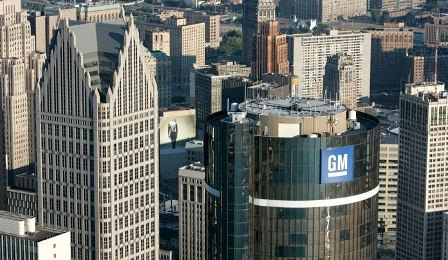Between The Lines: MT's Angus MacKenzie's on GM's Sinking Stock Price
Angus MacKenzie did everything but call TTAC by name in his essay GM Shares Tumble. So What? Yes, the Motor Trend scribe can “almost hear the Detroit death-watchers rubbing their hands with glee” at the news of GM's stock hitting two-year lows. It's true. Every time GM's share price dips, we light giant cigars, twirl our collective mustache and laugh maniacally. That Mr. MacKenzie sees critical coverage of the auto industry as journalistic schadenfreude goes some ways towards explaining Motor Trend’s increasingly toothless car reviews. But how can MacKenzie, an experienced car hack, justify pinning Detroit’s woes on anyone other than, well, Detroit? Hey, a man’s gotta eat.
What prompted GM's share price slump, said analysts, was a drop in the overall auto market, and worries about future profits in light of disappointing February sales… What the analysts really meant was Wall Street's money men don't think GM's a good bet for making them a quick buck right now. And if the money men don't think a company can make them a quick buck, then it's basically worthless.
This kind of rhetoric– references to unnamed, evil “money men”– smacks of Ye Olde International Jewish banking conspiracy. As populist as such a sentiment may be, it’s unconscionable for a responsible journalist to perpetuate such a well-worn shibboleth.
More to the point, MacKenzie is dead wrong. The short-term thinking that caused GM's stock price to head for the basement came from RenCen— not Wall Street. Nobody from the financial community forced General Motors to squander billions on misbegotten foreign alliances, or destroy its brands, or capitulate to union demands. Nobody told GM’s management to buy Saab and Hummer, or set-up Saturn. The end result of GM’s self-inflicted management failure is a company in deep financial crisis. This is clearly, unequivocally, completely GM’s fault.
In an era when nameless screen jockeys can move billions of dollars at the touch of a computer keyboard, Wall Street's institutionalized ADD has resulted in a feverish short-term view of the auto business. Lengthy product cycles and huge investment costs, combined with a fickle, cyclical, fashion-driven market, are just too damned difficult to deal with.
Sure. Automotive analysts like John Casesa begin looking at the car industry, get bogged down in the numbers and market cycles, throw up their hands and say, “Whoa! That’s just too damned difficult. Forgeddaboutit.” And what of all those institutional investors who’ve stood by The General for decades? In fact, GM was once known as a “blue chip stock,” held as much for its healthy dividend payments (recently halved) as its share price.
There’s one reason this is no longer true: the company’s management has run the automaker into the ground. And why’s that? According to Mr. MacKenzie, it’s all about GM’s pesky quarterly financial reports.
Maybe that's why the world's most successful automakers — Toyota, BMW and Porsche, to name three – are those that have never had to sweat a quarterly earnings call with a posse of skeptical Wall Street analysts ready to trash their stock price when they don't see the opportunity to make that quick buck.
Wrong. BMW files quarterly reports. Toyota files quarterly reports. As does every major automaker you can name save privately-held Chrysler– and we all know how well that’s going. As publicly held companies (save Porsche), ALL automakers have to face the music. Just like GM.
Never mind. MacKenzie is determined to paint GM as a victim– even if he has to undermine his own argument to do it.
Bunkie Knudsen, who ran Pontiac and Chevrolet in the '50s and '60s, reckoned it all started to go wrong when Fred Donner became president of GM in 1958. Knudsen was outraged Donner would insist on talking about GM's stock price, and what the analysts thought about it, at his daily meetings with the heads of GM's divisions. Before Donner, those meetings were mostly about making cars and trucks. After, as the financial engineers took over from the real ones, GM's cars and trucks got worse and worse.
Again, how is this Wall Street’s fault?
Bunkie Knudsen believed in a simple concept: The people in Detroit had to make good cars, and if they did, the people in New York would take care of the stock. After decades of fixating on financial engineering, GM is only now getting back to the business of making good cars. Only problem is, no one in New York seems to care anymore.
Reality check. It’s not “the money men’s” job to “care” about making good cars. That’s GM’s job. This they’ve failed to do, in spectacular fashion. MacKenzie’s finger-pointing at dark forces on Wall Street doesn’t change the fact that GM is in a hole of its own making. Their share price reflects that reality, which GM, like MacKenzie, refuse to face.
[Read MacKenzie's rant here.]
More by Edward Niedermeyer
Latest Car Reviews
Read moreLatest Product Reviews
Read moreRecent Comments
- Master Baiter I thought we wanted high oil prices to reduce consumption, to save the planet from climate change. Make up your minds, Democrats.
- Teddyc73 Oh look dull grey with black wheels. How original.
- Teddyc73 "Matte paint looks good on this car." No it doesn't. It doesn't look good on any car. From the Nissan Versa I rented all the up to this monstrosity. This paint trend needs to die before out roads are awash with grey vehicles with black wheels. Why are people such lemmings lacking in individuality? Come on people, embrace color.
- Flashindapan Will I miss the Malibu, no. Will I miss one less midsize sedan that’s comfortable, reliable and reasonably priced, yes.
- Theflyersfan I used to love the 7-series. One of those aspirational luxury cars. And then I parked right next to one of the new ones just over the weekend. And that love went away. Honestly, if this is what the Chinese market thinks is luxury, let them have it. Because, and I'll be reserved here, this is one butt-ugly, mutha f'n, unholy trainwreck of a design. There has to be an excellent car under all of the grotesque and overdone bodywork. What were they thinking? Luxury is a feeling. It's the soft leather seats. It's the solid door thunk. It's groundbreaking engineering (that hopefully holds up.) It's a presence that oozes "I have arrived," not screaming "LOOK AT ME EVERYONE!!!" The latter is the yahoo who just won $1,000,000 off of a scratch-off and blows it on extra chrome and a dozen light bars on a new F150. It isn't six feet of screens, a dozen suspension settings that don't feel right, and no steering feel. It also isn't a design that is going to be so dated looking in five years that no one is going to want to touch it. Didn't BMW learn anything from the Bangle-butt backlash of 2002?


































Comments
Join the conversation
Excellent demolition job on ill-informed gibberish, Edward, thank you. People who know nothing about which they are writing should be restrained from doing so. One minor quibble: Porsche is a publicly held company, albeit of a strange hybrid variety. It is listed on the Deutsche Borse as Porsche Automobil Holding SE. 50% of the capital is publicly quoted non-voting preferred and 50% ordinary voting shares, with the ordinaries entirely owned by the Porsche and Piech families. Of course, with the preferred being non-voting, the question of how much attention the P&P families have to pay to the holders of the ordinary is moot. Nevertheless, Porsche does report semi-annually, has a reasonably comprehensive investor relations section at the porsche.com/usa website, and holds an annual analyst conference in Stuttgart following the announcement of full-year results. Interestingly, Porsche fought a long war between 2001 and 2004 with Deutsche Borse for admission to the Prime Standard of the Frankfurt stock exchange (from the General Standard), with Deutsche Borse ultimately successful in its insistence that without quarterly reports, Porsche did not meet the investor transparency requirements of the Prime Standard. Incidentally, Porsche shares haven't been doing too well lately - down to E106.22 just before Easter from a high of over E180 in October (adjusted for the delisting of Porsche AG and relisting as a holding company). Reasons likely include concerns about consolidating VW, the Panamera development costs (in the high hundreds of million euros), as well as the pummeling luxury consumer cyclicals usually take in a recessionary bear market - see the share price charts for Coach and Burberry over the last year, for instance. Indeed, almost all automakers have seen their share prices suffering and in some cases collapsing - BMW, Renault, Fiat, Toyota, Honda, Ford - GM is hardly alone. But we couldn't expect misguided crusaders like Angus MacKenzie to understand that...
Remember C. Van Tune's Death Valley torture test and the Speed Blind tests? Those were very entertaining. MT's conducted a wide variety of greats tests. People canceled their subscriptions for naming the Prius the car of the year, yet today it's such a respected and significant car today. Plus, it's still entertaining and informative.